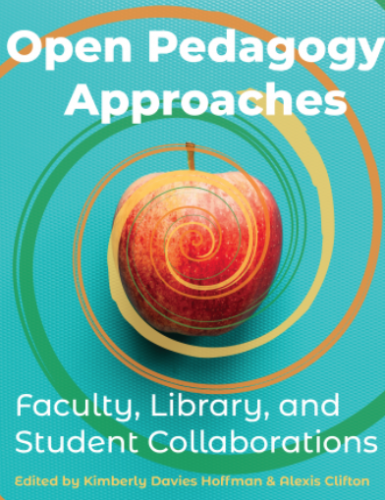
When the pandemic took root in cities across the country, many businesses, having no alternatives, were forced to put up “CLOSED” signs. Around the same time, some River Campus Libraries (RCL) librarians would have liked to mount a jumbo-sized neon sign at the top of Rush Rhees Library’s tower that said “OPEN.” And it wouldn’t have been to indicate that the libraries were virtually open; it would have been a call to action. Just imagine it: High above the Eastman Quad, an enormous, yellow (of the dandelion variety, of course) “OPEN, ” each intermittent flash advocating for open access; encouraging open pedagogy; recommending the use of open educational resources.
COVID-19 is not why librarians are pushing for Open, although it has helped make the case (e.g., Interlibrary loan and course textbooks). The pandemic has simply brought Open to the forefront. The University of Rochester helped keep it there with a new book.
Open Pedagogy Approaches (OPA) offers a collection of open educational resources and open pedagogy case studies that provide educators willing to explore the power and freedom of open with ideas, tips, and inspiration. As university campuses struggle with the high cost and prohibitive access of assigned course materials, “going open” offers alternatives that can equitably shift the state of student access and empower instructors.
Kim Hoffman, head of Outreach, Learning and Research Services at the RCL, began thinking about the book’s development while attending open pedagogy workshops by Robin DeRosa, director of the Open Learning & Teaching Collaborative at Plymouth State University.
“As [DeRosa] was talking, I thought about how to highlight relationships between librarians and professors that make these kinds of empowering course experiences possible,” says Hoffman.

The product of almost 30 University library staff members, faculty members, and students and dozens of other professionals from across the U.S. and Canada, OPA is a literal embodiment of Open. The entire book is openly licensed, as are the individual chapters. It also served as the foundational text for an open pedagogy course at Rochester, “Principles and Practices of Copyediting.”
“One of my major goals was to highlight that libraries can help in this domain,” says Hoffman. “I think faculty members sometimes stumble upon it and feel like they have to explore it alone. Each case study in the book shows how libraries can provide support and be a partner.”
To underscore the potential for an open partnership between libraries and faculty members, Hoffman organized a sort of OPA book club. Instructors were invited to read a chapter of the book, which they would discuss with a librarian or another instructor. Then, all readers assembled to share and discuss the takeaways from their respective chapters.
Jean Pedersen, associate professor of history, has always been curious about teaching a Wikipedia-based course, leading her to dive into OPA’s chapter “Teaching Wikipedia: A Model for Critical Engagement with Open Information.” She found it an engaging read on its own, but her biggest takeaways came from the group discussions. There she found a key Wikipedia collaborator in Lara Nicosia, the outreach librarian for history and religion and classics, who had several new ideas for Pedersen’s class.
“Reading the chapter was helpful in all kinds of ways,” says Pedersen. “It drew me further into the topic. It helped give me the push I needed to sign up for WikiEducator. And it connected me with a network that has me feeling very secure, even though I’m [teaching a wiki course] for the first time.”
Many readers also appreciated what the discussion represented.
“It was nice to see so many others who care about open education,” says Kyle Trenshaw, a STEM education specialist at the Center for Excellence in Teaching and Learning, who read the chapter “What If We Were to Go?” “I think it’s awesome they are willing to commit time and energy to make their courses more open. It made me really excited—knowing there is this subset of people working on this together.” ∎
For more information on Open Pedagogy Approaches or open education in general, contact Kim Hoffman at khoffman@library.rochester.edu. Enjoy reading about the University of Rochester Libraries? Subscribe to Tower Talk.

